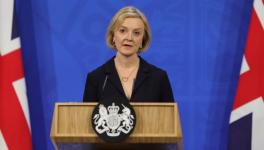Corbyn's New Labour Manifesto Fires Up Base, Angers UK Elites
Thomas Barlow of UK's Real Media says Labour leader Jeremy Corbyn's new "For the Many, Not the Few" manifesto puts sweeping progressive change on the table, much to the chagrin of the British political and media establishment.
Transcript
Aaron Maté: It's the Real News. I'm Aaron Maté. With less than a month before the British election, Labour leader, Jeremy Corbyn, has unveiled his party's manifesto.
Jeremy Corbyn: "People want a country run for the benefit of the many, not the few. That's because for the last seven years our people have lived through the opposite. A Britain for the rich and the elite and the vested interest. We are clear there is now a choice. Labour Brexit that puts jobs first, or a Tory Brexit that will be geared towards the interest of the City of London and risk making Britain a low wage tax haven."
Aaron Maté: Polls show a recent increase in Labour support, but Corbyn's party faces an uphill battle to unseat the conservatives lead by Prime Minister, Theresa May. Joining me now is Thomas Barlow, of Real Media, an independent media cooperative in the U.K. Thomas, welcome.
Thomas Barlow: Hi there.
Aaron Maté: Hi. Okay, so the Labour manifesto is called "For the Many, Not the Few." As I understand it, it was leaked to the press before hand, so people have had some time to process it. How has it been received so far?
Thomas Barlow: Well it's definitely fired up the base and whilst the press have predictably attacked it, the attacks haven't landed as much as they maybe thought they would have. They've done some funny front pages like The Daily Mail has said, "We're Going to Go Back to the 1970's" while simultaneously advertising an article that says the success of a long marriage is splitting jobs into girls jobs and boys jobs, so we're not quite sure who's going back to the 1970's there. What we are aware of is the base is fired up, Labour have increased in the polls, the people within the party dislike Jeremy Corbyn have found at least that they have something to campaign for with the manifesto itself, so the manifesto has actually been a hit and even though they tried to paint it as the leak is some kind of disaster, actually it's given people time to discuss them and we're having arguments about things that actually for 20 years we haven't been able to have.
Discussions about you know like making education free, like re-nationalizing the railways, like fully nationalized public services which are things that are incredibly popular, but we just haven't been allowed to discuss those publicly and that's something that this manifesto has now put squarely on the agenda.
Aaron Maté: When you say that the media has predictably attacked the manifesto, can you explain that more, because people outside of Britain might be unaware of the dynamic going on with Corbyn facing so much heat from the media and from people inside his own party?
Thomas Barlow: Yeah, well you know there's a couple of things. First off the press is owned ... 80% of it is owned by five billionaires. They produce far right publications which is The Daily Mail, The Express, Rupert Murdoch, who you're aware of, owns Fox News. It started off really building his empire in the U.K. so they're predictably antagonistic towards Jeremy Corbyn who specifically said that he will bring in regulations for the press. Currently the press regulation is being written by Paul Baker, who is the Editor at The Daily Mail and also the publication that has committed the most, has been caught most often breaking previous regulations. Most often printing falsehoods, so they're predictably against him.
Also, the liberal establishment, the BBC, and The Guardian, because for 20 years, they've been able to talk about personality politics rather than policies or issues. There have been ... Seem to be some kind of consensus around free market economics and liberal economics. This has been shaken up by Jeremy Corbyn and there's a lot of people within that establishment who are just quite frankly confused as to why he's the lead of the Labour party and they are antagonistic towards his program. They also then have tried to paint him as an ineffective leader, but this ineffectiveness as leader has been the backdrop of his own parliamentary party and the media establishment consistently attacking him from before he was even elected as the leader, so there has been outright hostility from all elements of the press from the get go. It's actually during the campaigning time when his policies to discuss and ideas to discuss that Jeremy Corbyn shines the most, and certainly the Labour party does.
Aaron Maté: You know one member of that political establishment, that has been hostile to Corbyn is the former Labour Prime Minister, Tony Blair, who has refused to endorse Corbyn, a member of his own party. What I find funny about the British election is that it's sort of the inverse of what we saw with the Democrats in the recent election. After Bernie Sanders lost to Hillary Clinton in the primary, there was huge pressure on his wing to come out and support and back Hillary at all cost to stop Trump. Now we're seeing a case where in Britain we have a progressive leader up for election and members of the Clinton type establishment in Britain, people like Tony Blair, who are more in the center are refusing to come out in support of the progressive.
Thomas Barlow: Yeah, absolutely and you know the crazy thing is, is that no one wants Tony Blair's support. It would be like Bush support ... You know the Republicans didn't want Bush's support in the 2008 election. They tried to distance themselves from him. Blair is a contaminated political figure, so every time he attacks Jeremy Corbyn he actually does Jeremy Corbyn a favor. Yes, absolutely the liberal establishment like the corporate Democrats, are completely antagonistic to losing power while simultaneously not really having anybody with any personality and certainly no policies or ideas that are popular with anyone. They don't really have a direction or set of tactics or strategy, but they know what they're against and they're against a progressive platform.
Yes, if Jeremy Corbyn had lost, they'd have been absolutely telling all of his supporters and him to fall in line to support the liberal leader whoever that would have been. They do not hold themselves to the same standards that they try and put on other people and that's being very impotent. That's something I hope that Americans can learn from, which is that the calls to unity are really only calls to unity behind a particular perspective, behind a particular politics, behind a particular personality, some ways for doing things. That would never be reciprocated.
Aaron Maté: In terms of the platform, again it's called "For the Many, Not the Few." Can you tell us some of the key facets of it that you think are important and that mark a break from previous Labour platforms of the past?
Thomas Barlow: Yes, so we have a nationalized, socialized health care system like most countries, but not like the U.S. New Labour under Tony Blair significantly started pretty much started the ball rolling on privatizing it from within. Starting selling services off of private companies. In fact, Real Media would be releasing a report about Simon Stevens who is the head of United Health in the U.S. who is also behind a lot of the privatization from within the NHS. Now Labour is saying under this manifesto they will reverse that trend, which is good news for people who care about health care, because there's better health outcomes under socialized medicine, but also for the taxpayer because it costs less when the public provides healthcare rather than private companies. Private companies have to make profits. They either cut back on services or more often charge the NHS more for that. There's a couple of vote winners in there like, you know not charging people to see car parts and stuff, but other key ones are rail nationalization and free tuition fees.
We're going back to when I grew up, we had free tuition fees for free university college education. It was inconceivable to me at the time that could ever charge people for education. It's a public good. It helps society and if anyone's got the skill or capability to go to university they should be able to. Now we're in a situation where our fees are almost as high as the U.S. and that has been a significant barrier. Again, it actually doesn't save the taxpayer any money and in the long run it's going to cost us a lot more money. It's going to cost us around six times the amount so the taxpayer ... So again, you know making tuition fees free, re nationalizing that, re-nationalizing railways, and again all of these save taxpayers money and provide better services.
All of these things have been popular with different segments of the population. Now we are having to debate, is it costed, can it work, are we all going to have to pay more tax? Well, like we've clearly promised is that under 80,000 pounds, anyone earning under 80,000 pounds will see no tax increases whatsoever. That includes VAT, the conservatives have always put up VAT and they said they'll probably do it again. That is Value Added Tax which is a sales tax, which everyone has to pay, but they've cut corporation tax. The inverse is true. Where corporation tax will go up under Labour and taxes to the rest of us will remain where they are, so it's good news for everyone and very much something a lot of people can get behind and can enjoy discussing. These are interesting debates right now.
Aaron Maté: Okay, Thomas, so the question is, is will this be enough to swing the election. I mentioned the polls earlier. I believe right now, Labour is at it's highest point in the polls since the start of this campaign, but will policy be enough to shift the election towards Corbyn to unseat Theresa May and the conservatives?
Thomas Barlow: Quite frankly, no I don't think so. The problems are multiple. Even if Corbyn gets above where Tony Blair was in 2005 when he won a significant victory around about 35% at the vote. What we have is a new political force in U.K. [inaudible 00:10:11] who's far right nationalists who sort of fought for Brexit. They're vote is collapsing completely and it's going to the conservatives, you know across the board. The conservatives are picking up an extra 10% of the vote, so even if Corbyn does well, he's above where Millerband was in 2015, he'll probably get to where Tony Blair was in 2005 around 35% that would be a significant achievement especially for policies quite different to one's they've been pushed, but we have a problem that there has been a widespread nationalist discourse, 30 years, especially about anti-immigration, about borders and that has found traction in a part of the populous that always votes, the over sixties, and the press hold significance sway in marginal constituencies in those swing seats, with over 60 year olds. It will be those people who make up the swing towards the conservatives in this elections and they will ensure probably quite considerable conservative victory.
However, what this does set up, is five years of engaged discussion around policy, around the future of this country and even though the conservatives will probably do some things that a lot of the younger generation and people generally don't' want to see, it's going to set the nation back quite considerably, it's not going to be without resistance and it's certainly going to start exacerbating a generational divide and what we will see over the next five years, a few million new young people come into the election and old people disappear out of the election and maybe there will be a change over five years. It's been an important change but it's not going win the election I don't think.
Aaron Maté: Well all the more reason why journalism during the period will be paramount and Thomas we thank you for your journalism and for joining us today on The Real News.
Thomas Barlow: Thank you very much for having me.
Aaron Maté: And thank you for joining us on The Real News.
Disclaimer: The views expressed here are the author's personal views, and do not necessarily represent the views of Newsclick.
Get the latest reports & analysis with people's perspective on Protests, movements & deep analytical videos, discussions of the current affairs in your Telegram app. Subscribe to NewsClick's Telegram channel & get Real-Time updates on stories, as they get published on our website.
























